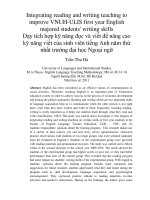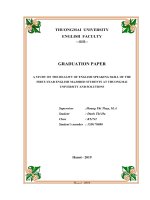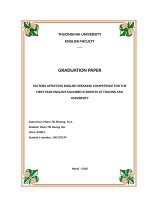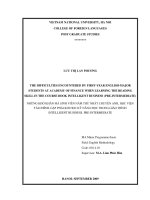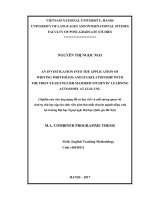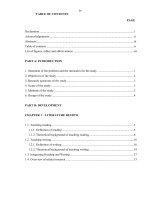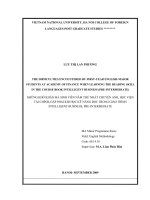Difficulties facing vnuas first year english majored students in speaking 2 lessons
Bạn đang xem bản rút gọn của tài liệu. Xem và tải ngay bản đầy đủ của tài liệu tại đây (1.14 MB, 57 trang )
VIET NAM NATIONAL UNIVERSITY OF AGRICULTURE
FACULTY OF EDUCATION AND FOREIGN LANGUAGES
BA THESIS
DIFFICULTIES FACING VNUA'S FIRST-YEAR
ENGLISH-MAJORED STUDENTS IN SPEAKING 2
LESSONS
NHỮNG KHÓ KHĂN CỦA SINH VIÊN NĂM NHẤT
CHUYÊN NGÀNH NGÔN NGỮ ANH TẠI VNUA
TRONG CÁC GIỜ HỌC NÓI 2
Student
: TRINH THI DIU
Student code
: 621213
Major
: ENGLISH LINGUISTICS
Supervisor
: NGUYEN THI LAN ANH, M.A
Hanoi - 2021
VIET NAM NATIONAL UNIVERSITY OF AGRICULTURE
FACULTY OF EDUCATION AND FOREIGN LANGUAGES
BA THESIS
DIFFICULTIES FACING VNUA'S FIRST-YEAR
ENGLISH-MAJORED STUDENTS IN SPEAKING 2
LESSONS
NHỮNG KHÓ KHĂN CỦA SINH VIÊN NĂM NHẤT
CHUYÊN NGÀNH NGÔN NGỮ ANH TẠI VNUA
TRONG CÁC GIỜ HỌC NÓI 2
Student
: TRINH THI DIU
Student code
: 621213
Major
: ENGLISH LINGUISTICS
Supervisor
: NGUYEN THI LAN ANH, M.A
Hanoi - 2021
CERTIFICATE OF ORIGINALITY
I, the undersigned, hereby certify my authority of the study project report
entitled “ Difficulties facing VNUA’s first-year English-majored students in
speaking 2 lessons”. submitted in partial fulfillment of the requirements for the
degree of Bachelor in English Language. Except where the reference is
indicated, no other person’s work has been used without due acknowledgement
in the text of the thesis.
Hanoi, July 2021
Trinh Thi Diu
Approved by
SUPERVISOR
(Signature and full name)
Date:……………………
i
ACKNOWLEDGEMENT
In the process of completing this graduation paper, I have received many
necessary assistances, precious ideas and timely encouragements from my
teachers, family and friends.
I would like to express my sincere thanks to my supervisor Nguyen Thi
Lan Anh, M.A for her precious advice, practical suggestions and constant
encouragement in the preparation and completion of this graduation paper.
Without her help this graduation paper would not have possibly been completed.
I would also like to express my great gratitude to all the teachers at
Vietnam National University of Agriculture for their devoted teaching and for
giving me gain valuable knowledge during the four years at this university.
I would be also grateful to the teachers and K65 first-year students at the
Faculty of Education and Foreign Languages, Department of Professional
English was helpful and happy to answer my interview and fill out my
questionnaire.
Finally, I wish to extend my special thanks to my family and my friends
for their assistance and encouragement in the making of this graduation paper.
Due to the limited scope and time, errors are inevitable in this BA thesis.
Therefore, I look forward to receiving your comments and suggestions to further
improve the graduation paper.
Sincerely thanks!
ii
TABLE OF CONTENTS
CERTIFICATE OF ORIGINALITY................................................................. i
ACKNOWLEDGEMENT .................................................................................. ii
ABSTRACT ......................................................................................................... v
LIST OF ABBREVIATION .............................................................................. vi
LIST OF TABLES AND FIGURES ................................................................ vii
PART 1: INTRODUCTION.............................................................................. 1
1. RATIONALE FOR THE STUDY ................................................................... 1
2. AIMS AND OBJECTIVES OF THE STUDY ................................................. 1
3. RESEARCH QUESTIONS ............................................................................. 2
4. SCOPE OF THE STUDY .............................................................................. 2
5. SIGNIFICANCE OF THE STUDY ................................................................ 3
6. DESIGN OF THE STUDY ............................................................................ 3
PART 2: DEVELOPMENT ............................................................................... 5
CHAPTER 1: LITERATURE REVIEW .......................................................... 5
1.1. REVIEW OF THE PREVIOUS STUDIES (AT HOME & ABROAD) ........ 5
1.1.1. At home research .................................................................................................... 5
1.1.2. Abroad research ..................................................................................................... 6
1.2. REVIEW OF THEORETICAL BACKGROUND ........................................ 7
1.2.1. Definition of English speaking skill....................................................................... 7
1.2.2. The importance of speaking skill .......................................................................... 8
1.2.3. Characteristics of speaking skill.......................................................................... 11
1.2.4. What a good speaker does ................................................................................... 14
1.2.5. Factors affecting speaking skill ........................................................................... 15
1.2.6. Conclusion ............................................................................................................. 16
1.3. SUMMARY ............................................................................................... 17
CHAPTER 2: METHODOLOGY ................................................................... 18
2.1. RESEARCH METHODOLOGY ............................................................... 18
iii
2.2. RESEARCH SETTING ............................................................................. 19
2.3. DATA COLLECTION............................................................................... 20
2.3.1. Data collecting instruments ................................................................................. 20
2.3.2. Data collecting procedures ................................................................................... 20
2.4. DATA ANALYSIS...................................................................................... 21
2.5. SUMMARY ............................................................................................... 22
CHAPTER 3: FINDINGS AND DISCUSSION ............................................. 23
3.1. FINDING & DISCUSSION ON RESULTS FROM QUESTIONNAIRE .. 23
3.1.1. Finding ................................................................................................................... 23
3.1.2. Discussion .............................................................................................................. 29
3.2. FINDING & DISCUSSION ON RESULTS FROM THE INTERVIEW ... 31
3.2.1. Finding ................................................................................................................... 31
3.2.2. Discussion .............................................................................................................. 34
3.3. SUGGESTIONS ON IMPROVING THE STUDENTS’ ENGLISH
SPEAKING PERFORMANCE ........................................................................ 35
3.4. SUMMARY ............................................................................................... 39
PART 3: CONCLUSION ................................................................................. 40
1. RECAPITULATION .................................................................................... 40
2. CONCLUDING REMARKS ........................................................................ 41
3. LIMITATIONS OF THE STUDY................................................................. 42
4. SUGGESTIONS FOR FURTHER STUDIES .............................................. 42
REFERENCES .................................................................................................. 43
APPENDICES ................................................................................................... 45
iv
ABSTRACT
Speaking skills are often identified as an important, essential skill of the
process of learning a foreign language in general and English in particular. It is
used largely as the medium of communication in many different fields such as
science, technology, aviation, international sport and diplomacy, etc. English
helps people to communicate with each other although they are from different
countries and speak different languages. Most language learners find it difficult
to express themselves in spoken language. They are generally facing problems
using a foreign language to express their thoughts effectively. This study aims to
find out the difficulties of the first-year English-majored at the Vietnam
National University of Agriculture in speaking 2 lessons, then find out the
causes and give suggestions to improve the performance of their speaking
English.
This study will analyze the characteristics of speaking skills; the difficulties
facing English learners in Speaking 2 at VNUA, the causes and suggestions on
improving English students’ speaking performance. An online survey
questionnaire was conducted to answer the research question: “What are the
difficulties met by the first-year English-majored students when they learn
speaking skills at VNUA? “60 students completed the online survey
questionnaire. Then an interview with 5 students to find out specific difficulties
and causes in speaking skills. Preliminary results show that the main cause is
linguistic and non-verbal problems. Based on the research results, the researcher
has given some suggestions to faculty and students about classroom activities
and extracurricular to develop their English speaking skills. The study hopes that
these suggestions will help first-year English-majored in particular and English
learners in general become aware of the right ways to speak English fluently.
v
LIST OF ABBREVIATION
VNUA: Vietnam National University of Agriculture
TMU: Thuongmai University
EFL: English as a Foreign Language
vi
LIST OF TABLES AND FIGURES
Table 3.1.1. Difficulties facing the first-year English-majored students in
learning English speaking from their own perspective. ( Page 23 )
Table 3.1.2. An assessment of the language difficulties of first-year Englishmajored students at VNUA. ( Page 24 )
Table 3.1.3. An assessment of the psychological difficulties of first-year
English- majored students at VNUA. ( Page 25 )
Table 3.1.4. An assessment of learning methods difficulties of first-year
English- majored students at VNUA. ( Page 26 )
Chart 3.1.1. Difficulties facing the first-year English-majored students in
learning English speaking. ( Page 28 )
vii
PART 1: INTRODUCTION
1. RATIONALE FOR THE STUDY
Nowadays, speaking is one of the most important skills to be developed
and enhanced in daily lives. Speaking skill is the ability to express verbally.
Speaking skill is different from other skills such as Reading, Writing, Listening
in that it is a combination of many factors to make a speech. Speaking skill is a
special form of human skill; it is not what’s genetic and not congenital. It is
regarded as one of the most difficult aspects of language learning. Most
language learners find it difficult to express themselves in spoken language.
They are generally facing problems using a foreign language to express their
thoughts effectively. Speaking skill is formed and developed in the process of
communication, there are many ways to express the language to be expressed.
For ordinary people, the speaker uses words to express their ideas and
aspirations; for people with language impairments, they will use body language
such as limbs, eyes… to express their ideas.
After studying at the Faculty of Education and Foreign Languages, Viet
Nam National University of Agriculture for nearly four years, I realize that the
first-year students of English major still have many difficulties in their speaking
skills. In the hope of finding out the difficulties of speaking that they normally
get, a study entitled: “ Difficulties facing VNUA’s first-year English-majored
students in speaking 2 lessons” has been conducted because of all the abovementioned reasons.
2. AIMS AND OBJECTIVES OF THE STUDY
The study is aimed to survey and research the difficulties faced by firstyear English-majored at VNUA. From there, find out the causes and suggestions
to help students overcome their English speaking skills. Within my reach of
understanding, I would only like to go through the Literature Review of
1
speaking, the common strategies to improve the students’ English speaking
skills, then I would like to give the methodology of the study research.
The objectives focusing on survey and interview to find out the difficulties
that first-year students English-majored face in Speaking 2. (Data processing
and analysis). Find out the causes of the difficulties that students are facing.
Propose suggestions to improve students' difficulties in Speaking 2 lessons.
3. RESEARCH QUESTIONS
The basic research questions for the study are:
(1) What are the difficulties facing the first-year English-majored students
when they learn speaking skills at VNUA?
(2) What are the causes behind those difficulties?
(3) What are some suggestions to improve their English speaking skill?
4. SCOPE OF THE STUDY
The study is about learning speaking skills for first-year English-majored
students at VNUA and focused on 4 classes K65ENGA, K65ENGB, K65ENGC
and K65ENGE taught by Ha Thi Lan, M.A. Speaking 2 is learned by
"Cambridge English Preliminary" syllabus in two credits for eight weeks of
theory and three weeks of practice from 8th March to 16th May 2021 ( from
two or three periods a week, fifty minutes each period. Specifically, classes
K65ENGA, C, E study theory for 8 weeks, 3 periods per week. As for the
K65ENGB class, there are 6 weeks of theory, 2 lessons per week, 2 periods each
lesson. All classes have 3 weeks of practice, 5 periods per week).
2
5. SIGNIFICANCE OF THE STUDY
In finding out the difficulties of first-year English-majored students in
learning speaking English and some suggested solutions, hopefully the research
results will be used as a reference to help students learn better speaking skills in
the next semesters. In addition, the results of this study is very important
significance, it not only pinpoints problems students have in speaking English
but also indicates the weaknesses students have in the four macro skills of
English. Therefore, the methods and suggestions of this study can address
students' difficulties in order to improve their English speaking skills. I also
hope that the findings of the research will really be necessary knowledge that
helps me to understand more about English to improve my English language
skills.
6. DESIGN OF THE STUDY
Apart from abstract, references & appendices, the study consists of three
main parts:
PART 1 - INTRODUCTION presents the rationale of the study, aims and
objectives of the study, research questions, the scope as well as the significance
of the study.
PART 2 - DEVELOPMENT is divided into 3 chapters:
Chapter 1 - LITERATURE REVIEW – Review of the previous studies (At
home & abroad) & Review of theoretical background for the study including
definitions of English Speaking skills, the importance of Speaking skills,
characteristics of Speaking skills and what a good speaker does.
Chapter 2 – METHODOLOGY describes the methodology used in the research
including research methodology, research setting, data collection, data analysis.
3
Chapter 3 - FINDINGS AND DISCUSSIONS - reports and discusses the
findings of the study.
PART 3 - CONCLUSION summarizes the main issues that have been addressed
in the study, points out the limitations, draws pedagogical implications
concerning the research topic and suggests several solutions.
4
PART 2: DEVELOPMENT
CHAPTER 1: LITERATURE REVIEW
1.1. REVIEW OF THE PREVIOUS STUDIES (AT HOME & ABROAD)
1.1.1. At home research
Trinh Thi Tuyet (2019) carried out a study "Difficulties in English
Speaking Skill of Thuongmai University 's first-year English-majored and
Solutions" would provide background about English and English speaking. The
paper also indicates some problems and difficulties that English learners have to
encounter when speaking English. Based on given theories and previously relate
studies, the paper conducts a survey and makes a questionnaire to interview
first-year English-majored. After data collection process, the study analyzes and
indicates the importance of English speaking to first-year students. Besides, the
actual English speaking level of first-year is shown in this paper as well. The
study shows the frequency of learning English speaking of first-year and the
main way that most of freshmen apply when they practice speaking English.
Afterwards, the study shows the advantages and disadvantages in their leaming
ways and finds out some main difficulties and problems they face to. Then, to
each difficulty and problem, the paper provides some solutions to deal with,
solutions for students and for TMU as well. The study hopes that these solutions
would help first-year students in particular and English learners in general aware
of the suitable ways to master English speaking.
A study on techniques to improve speaking skills for secondary students in
Quang Ninh by Pham Thi Huyen Huong aims at outlining the definitions of
speaking skills and the characteristics of teaching speaking skills, the difficulties
teachers cope with when teaching speaking skills. Pointing out some techniques
which can be used to teach speaking skills for Secondary students in Quang
5
Ninh. Implementing the survey questionnaires to the teachers at Cam Son
Secondary school to explore the real situation of teaching English-speaking
skills in Secondary students in Quang Ninh. Suggesting some effective activities
used to teach speaking to secondary students at Secondary school to encourage
them to speak.
1.1.2. Abroad research
Eissa, Misbah, and Najat (1988) performed a study towards the difficulties
of using English as a means of instruction and communication. The results of
this study displayed that learners had many difficulties in using English
language as a means of instruction. A lot of participants stated that their learners
have low English proficiency. The results also indicated that a lot of learners
faced serious difficulties in understanding the lectures’ content without
translating or applying first language to deliver the content of the lectures.
In Mustafa Mubarak Pathan (2014) research study about " An Overview of
Major Difficulties Faced by the Libyan EFL Learners in Speaking Skill", He
pointed out several causes of difficulty in practicing speaking skills, such as
pronunciation, the use of adjectives, the use of prepositions, the use of idioms,
grammatical errors, semantic errors, other problems ( lack of vocabulary,
fear/embarrassment while communicating, lack of interest and motivation, lack
of practice, lack of environment for practice, ...), influenced by mother tongue.
He gave the reasons for the above reasons: "Their failure to recognize this is
primarily because of the failure on the part of their teachers to make them
understand this fact at the very early stage of their learning. And this failure on
the part of the teachers is because of the fact that most of the EFL school
teachers in Libya are neither trained properly for this reason nor are their skills
upgraded."
6
Ali Dincer and Savas Yesilyurt (2013) carried out a study towards teachers’
beliefs on speaking skills based on motivational orientations. The results of their
study indicated that the teachers had negative opinions about speaking
instruction though they believed that it was of great significance in speaking
skills. The results also revealed that the teachers felt unskilled in oral
communication though they had various motivational orientations towards
speaking English. The researchers indicated that those learners have different
opinions about the significance of speaking skills in English language and this
difference is related to the learners’ motivational orientations and their
competent/incompetent feelings in speaking skills. The results demonstrated that
learners’ self-assessment about their speaking skills was negative and they
expressed themselves as incapable speakers of English. Just some of them
expressed that they had a good position in taking part in speaking tasks.
1.2. REVIEW OF THEORETICAL BACKGROUND
1.2.1. Definition of English speaking skill
Speaking skills are the ability to express verbally. Speaking skills are
different from other skills such as reading, writing, listening in that it is a
combination of many to make a speech. Speaking skills are formed and
developed in the process of communication, the learning mastery and
implementation of various communication behaviors. Speaking skills are
considered as the external manifestation of capacity, wisdom. (Platonov, 1963 )
Speaking is an act of making vocal sounds. We can say that speaking
means to
converse,
or
expressing
one's
thoughts
and
feelings
in spoken language. To speak often implies conveying information. Speaking
skills are the skills that give us the ability to communicate effectively. (Hopkins,
David. 1993)
7
Speaking is regarded as very important for language teaching and learning.
Speaking is a bridge to reach other skills. It helps leamers to read better, to listen
more effectively and to write more accurately. Speaking is surely the most
effective means of communication. (Ur, 1996)
Mai Thanh Thu (2008) carried out researched on some difficulties which
students faced in speaking. She also stated that: It is often spontaneous, open
ended and evolving. However, speech is not always unpredictable. Language
functions that tent to recur in certain discourse situations (declining and
invitation, requesting time off from work) can be identified and charted.
Speaking requires not only that learners know how to produce specific points of
lanzuage, such as grammar, pronunciation, vocabulary ( linguistic competence ),
but also that they understand when, why and in what way to produce language.
Speaking requires that learners not only know how to produce specific
points of language such as grammar, pronunciation, or vocabulary (linguistic
competence), but also that they understand when, why, and in what ways to
produce language (sociolinguistic competence). Finally, speech has its own
skills, structures, and conventions different from written language (Burns &
Joyce, 1997). A good speaker synthesizes this array of skills and knowledge to
succeed in a given speech act.
There are a lot of concepts of speaking. Each researcher gives his own idea
and tries to approve that it is true. But all of them agree that speaking is very
important skill, and they all try to find out the nature of speaking, speaking act,
in which the speakers, speaking process, and speaking message are emphasized.
1.2.2. The importance of speaking skill
Humans are programmed to speak before they learn to read and write. In
any given, human beings spend much more time interacting orally with language
8
rather than using it in its written form. Speaking is the most important skill
because it is one of the abilities that is needed to perform a conversation.
English speaking is not an easy task because speakers should know many
significant components like pronunciation, grammar, vocabulary, fluency, and
comprehension. Learners should have enough English speaking ability in order
to communicate easily and effectively with other people. According to Brown
(1994), listening and speaking are learners’ language tools.
In the present global world, communication plays a vital role in getting
success in all fields. Thus, speaking skills are a vitally important method of
communication. Among the four key language skills, speaking is deemed to be
the most important skills for learning a foreign language. When one thinks of
speaking skills, one tends to think of it as a common skill. The ability to stand
before others and speak effectively is not an ordinary ability. Many people are
deathly afraid of public speaking. Employers have always valued the ability to
speak well. Speaking skill always will be, an important skill, and well worth the
effort in fully developing.
The four language skills of listening, speaking, reading, and writing are all
interconnected. Proficiency in each skill is necessary to become a well-rounded
communicator, but the ability to speak skillfully provides the speaker with
several distinct advantages. The capacity to put words together in a meaningful
way to reflect thoughts, opinions, and feelings provides the speaker with these
important advantages:
• Ability to inform, persuade, and direct. Business managers, educators,
military leaders, lawyers, and politicians, among others, seek to develop their
speaking skills to such a level that they are transformed into master
communicators. Speaking clearly and confidently can gain the attention of an
audience, providing the golden opportunity for the speaker to make the message
9
known. Wise is the speaker who gains and then holds the attention of an
audience, with well-chosen words in a well-delivered presentation, forming a
message that is effective, informative, and understood.
• Ability to stand out from the rest. When one thinks of speaking skills, one
tends to think of it as a common skill. Think again. The ability to stand before
others and speak effectively is not an ordinary ability. Many people are deathly
afraid of public speaking; others have little ability to form thoughts into
sentences and then deliver those words in a believable way. The bad news is that
at any given moment the world has precious few with the speaking talents of,
say, Winston Churchill or John F. Kennedy. The good news is that a speaker
whose skills are honed and developed with constant application and hard work
can stand out.
• Ability to benefit derivatively. Well-developed verbal skills can increase
one’s negotiation skills. Self-confidence is improved. A growing sense of
comfort comes from speaking in front of larger and larger audiences. A
reputation for excellence in speaking can accrue over time, thereby imparting a
certain credibility to the speaker.
• Career enhancement. Employers have always valued the ability to speak
well. It is, and always will be, an important skill, and well worth the effort in
fully developing.
Humans are programmed to speak before they learn to read and write. In
any given, human beings spend much more time interacting orally with language
rather than using it in its written form. Speaking is the most important skill
because it is one of the abilities that is needed to perform a conversation.
English speaking is not an easy task because speakers should know many
significant components like pronunciation, grammar, vocabulary, fluency, and
10
comprehension. Learners should have enough English speaking ability in order
to communicate easily and effectively with other people.
The significance of speaking is indicated with the integration of the other
language skills. Speaking helps learners develop their vocabulary and grammar
skills and then better their writing skill. Students can express their emotions,
ideas; say stories; request; talk, discuss, and show the various functions of
language. Speaking is of vital importance outside the classroom. Therefore,
language speakers have more opportunities to find jobs in different
organizations and companies. These statements have been supported by Baker
and Westrup (2003) who said that learners who speak English very well can
have greater chance for better education, finding good jobs, and getting
promotion.
To sum up, when students learn English, speaking is significant to support
their ability to apply the language. Speaking skill has been very important to the
success of human beings. The significance of speaking skill is observed in the
daily activities of persons. Speaking is an interactive activity and it occurs under
the real time constraints. That is, persons can use words and phrases fluently
without very much conscious thinking. Speaking skill enables individuals to
produce sentences for the real communication, in other words they actually like
to communicate in language to get specific objectives.
1.2.3. Characteristics of speaking skill
According to Mazouzi (2013), learners’ activities should be designed
based on an equivalence between fluency and accuracy achievement. Both
fluency and accuracy are important elements of communicative approach.
Classroom practice can help learners develop their communicative competence.
So they should know how the language system works appropriately.
11
The first characteristic of speaking performance is fluency and it is the
main aim of teachers in teaching speaking skill. Fluency is the learners’ ability
to speak in understandable way in order not to break down communication
because listeners may lose their interest. To achieve this goal, the teachers then
should train learners to use their personal language freely to express their own
ideas and then avoid imitations of a model of some kind. Many of foreign
language speakers think of fluency as the ability to speak fast, that is why they
start speaking rapidly without pauses. Thornbury argues that speed is an
important factor in fluency and pausing too, because speakers need to take
breath. Native speakers also need to pause from time to time in order to let the
interlocutors catch what they said. However, a frequent pausing is an indication
that the speaker has problem of speaking. In such cases Thornbury suggests
what is called “tricks” or production strategies, i.e. the ability to fill the pauses.
The most common pause fillers are "uh” and "um”, vagueness expressions such
as "short of "and "I mean". Another device for filling the pauses is the reputation
of one word when there is a pause. It is the ability to answer coherently by
connecting the words and phrases, pronouncing the sounds clearly, and using
stress and intonation.
The second characteristic of speaking performance is accuracy. Nowadays
most foreign language teachers emphasized the term of accuracy in their
teaching because learners seek more to be fluent and they forget about being
accurate. Without structuring accurate speech, speakers will not be understood
and their interlocutors will lose interest if they perform incorrect utterances each
time. Therefore, paying attention to correctness and completeness of language
form is of more importance for oral proficiency. Therefore, learners should
focus on a number of things in their production of the spoken language, mainly,
the grammatical structure , vocabulary and pronunciation.
12
According to Thornbury (2005), learners’ correct use of grammatical
structures requires the length and complexity of the utterances and the wellstructured clauses. To gain accuracy in terms of vocabulary means to select
suitable words in the suitable contexts. Learners sometimes apply similar words
or expressions in various contexts which do not mean similar things. So learners
should be able to use words and expressions correctly.
• Grammar:
The grammatical accuracy refers to the range and the appropriate use of the
learners’ grammatical structure that involves the length and the complexity of
the utterances in addition to the ability to use the subordinating clauses. The
grammar of speech differs of that of writing.
• Vocabulary:
Achieving accuracy in terms of vocabulary refers to the appropriate
selection of words during speaking. Students often find difficulties when they
try to express what they want to say, they lack the appropriate vocabulary, and
they sometimes use words incorrectly like in the case of synonyms which do not
carry the same meaning in all contexts. Students then, have to be able to use
words and expiration accurately.
• Pronunciation:
English language has been long considered by either native speakers or
nonnative speakers as a difficult language because of its pronunciation.
Learners, then who want to develop their speaking skill in English should
practice pronunciation overall. They should be aware of the different sounds and
their features and where they are made in one’s mouth; they have also to be
aware of where the words should de stressed, when to use raising intonation and
when to use a falling one. All these issues give them extra information about
13
how to speak English effectively and help to achieve the goal of a better
understanding of spoken English.
Thornbury (2005) declared that pronunciation is the lowest level of
knowledge learners typically pay attention to it. In order to speak English
language accurately, learners should master phonological rules and they should
be aware of the various sounds and their pronunciations. Learners should also
know the stress, intonation, and pitch. All of these elements help learners speak
the English language easily and effectively.
1.2.4. What a good speaker does
Speakers must be able to anticipate and then produce the expected patterns
of specific discourse situations. The learner must also choose the correct
vocabulary to describe the item sought, rephrase or emphasize words to clarify
the description if the clerk does not understand, and use appropriate facial
expressions to indicate satisfaction or dissatisfaction with the service. (Burns &
Joyce, 1997)
Other skills and knowledge that instruction might address include the
following: producing the sounds, stress patterns, rhythmic structures, and
intonations of the language; using grammar structures accurately; assessing
characteristics of the target audience, selecting vocabulary that is understandable
and appropriate for the audience, the topic being discussed, and the setting in
which the speech act occurs; applying strategies to enhance comprehensibility,
such as emphasizing key words, rephrasing, or checking for listener
comprehension; using gestures or body language; and paying attention to the
success of the interaction and adjusting components of speech such as
vocabulary, rate of speech, and complexity of grammar structures to maximize
listener comprehension and involvement (Brown, 1994).
14
Teachers should monitor learners' speech production to determine what
skills and knowledge they already have and what areas need development.
Bailey and Savages New Ways in Teaching Speaking (1994), offer suggestions
for activities that can address different skills.
1.2.5. Factors affecting speaking skill
According to Mahripah (2014), EFL learners’ speaking skill is affected by
some linguistic components of language like phonology, syntax, vocabulary, and
semantics and psychological factors such as motivation and personality.
Phonology is a difficult aspect of language learning for EFL learners. As we
know, English is not a phonetic language. That is, the pronunciation of English
words are not similar to their spellings. Words with similar spellings are
sometimes pronounced differently because of their surrounding contexts like
tenses and phonemes that come after them. This can cause a lot of problems for
non-native speakers of English and they sometimes get confused in producing
the English words.
EFL learners should have knowledge of words and sentences. They should
comprehend how words are divided into different sounds and how sentences are
stressed in specific ways. Grammatical competence can help speakers apply and
perceive the structure of English language correctly which leads to their fluency
(Latha, 2012). Native speakers say what they want without having any problems
because they are familiar with the language. If they have problems in expressing
some concepts, they try to use other ways of telling those things. They may
make certain mistakes syntactically but these mistakes do not change the
meaning of the sentences they want to express and this doesn’t create serious
problems for the listeners to comprehend them. But the mistakes non-native
15
speakers commit are those that change the meaning of utterances they want to
convey and can create some problems for their understanding (Mahripah, 2014).
Motivation can influence and be influenced by the components of language
learning. According to Merisuo-Storm (2007), an integrative and friendly view
towards the people whose language is being learned makes sensitize learners to
the audio-lingual aspects of language and making them more sensitive to the
pronunciation and accent of language. If learners have an unfriendly attitude
towards the language, they will not have any substantial improvement in
acquiring the different features of the language. The above sentences support the
view that just communicative competence is not sufficient for learners to
improve their speaking skills. Without positive attitudes towards speaking
performance, the aim of speaking will not be obtainable for learners.
1.2.6. Conclusion
This paper reviewed the factors that affect students’ English speaking
performance. The mentioned factors in this study have an important role in
developing learners’ speaking skills. The factors make learners less selfconfident and less comfortable in their speaking classes. Based on the review of
the literature of the study, teachers should understand their students’ interests
and feelings, improve their learners’ self-confidence, and choose the best
teaching method to keep their learners’ involved in the speaking activity.
Teachers should praise their students to speak English. They should build a
friendly relationship with their students, make them feel very happy in the class
and have a feeling of great enthusiasm and eagerness to study English in general
and speak English in particular. The literature review of this study represented
that teachers should give their learners enough time for speaking skill, help
them overcome their timidness through friendly behaviors to make them feel
16
